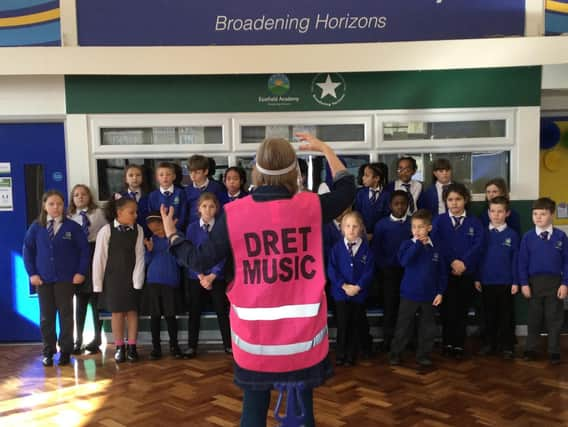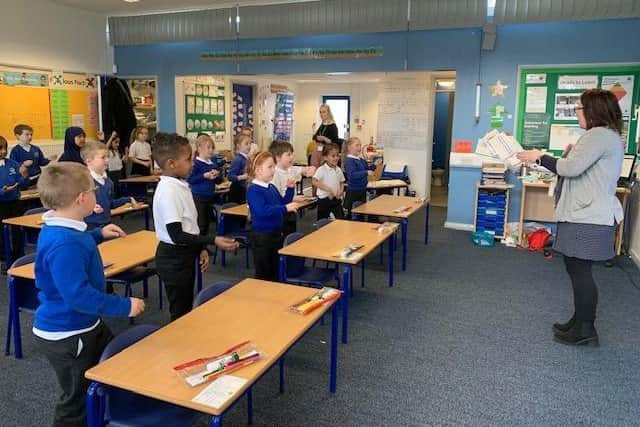Northampton schools welcome government’s new music curriculum after spending lockdowns making tunes


Two Northampton schools have welcomed the government’s new music curriculum as the subject has been particularly important during the coronavirus pandemic.
The Department of Education’s new curriculum for key stages one, two and three and give pupils the opportunity to listen to and learn about music through the ages, from Mozart and Bach to The Beatles and Whitney Houston.
Advertisement
Hide AdAdvertisement
Hide AdMusic is a key part of the day for students at Eastfield Academy and Malcolm Arnold Academy, even when many were learning from home during the lockdowns.


Eastfield head teacher Clair Mills said: “The daily music sessions across the school are part of our school curriculum and I cannot imagine our timetables without them.
“Staff and pupils enjoy the sessions and non-specialists are supported by the great planning and resources available.”
At Eastfield Academy, all pupils have music as part of their daily curriculum, using resources which non-specialist teachers are confident delivering.
Advertisement
Hide AdAdvertisement
Hide AdThe daily sessions ensure children’s music learning is built upon every day and embedded for the future – with the result that pupils love singing, performing, composing, and discovering more about music, according to Ms Mills.
“We have seen a really positive impact on all pupils as music provides a level playing field for all including our EAL (English as an additional language) and disadvantaged pupils,” she said.
“Our pupils have the confidence to perform to a variety of audiences and this confidence goes beyond the music curriculum.
“The past year has presented us with some challenges in regard to delivering our music curriculum, but the short daily sessions have been perfect, both for remote learning and at school.
Advertisement
Hide AdAdvertisement
Hide Ad“We have definitely proved we can do music, no matter what!"
Meanwhile at Malcolm Arnold Academy, during the third lockdown, vulnerable and key worker children attending school formed bubbles of 25 students, with each becoming a separate rock band.
Every student had their own role to play within the band despite the range of experience within them, working on their parts individually before rehearsing as a class ensemble.
Spending an hour a week working on practical music gave each student the chance to develop a high-level understanding of music, and having started as a lockdown project, is now a key facet of the school’s curriculum.
Advertisement
Hide AdAdvertisement
Hide AdBoth schools are part of the David Ross Education Trust (DRET), whose executive director of music Simon Toyne played a key role in shaping the new curriculum.
“The value of music in children’s education has been well rehearsed, but usually explained in terms of transferrable skills,” he said.
“The importance of the model music curriculum is its shining light on the intrinsic qualities of music as a subject in its own right.
“Music is a craft, in which powerful knowledge and skills continually feed each other.
Advertisement
Hide AdAdvertisement
Hide Ad“Children and young people learn not just from their teachers, but from each other, from musicians practising now, and from the rich heritage of musicians that have gone before us.
“Every child and young person brings their individual musical experience to the classroom; great teachers nurture them, developing their musicianship and introducing them to music that they haven’t encountered before. With every lesson, children’s musical personalities develop.”
The emphasis on music at Eastfield Academy is shared across DRET, which works in partnership with arts organisations and venues to provide invaluable opportunities for academies, teachers and students.
Every year towards the end of the spring term, hundreds of pupils from 22 primary schools at the trust join together to sing as part of a primary music festival.
Advertisement
Hide AdAdvertisement
Hide AdDRET primary music specialist Sarah Wise said: “This is about music as a subject in its own right; music at the heart of the school day, every day.
“However, music also has a vital part to play in a healthy recovery - bringing classes of children together again, complementing the learning in other subjects, and providing breaks in the day.
“A body percussion activity or short song will invigorate both teachers and children ready for the next lesson.
“Little and often is an old phrase, but curriculum music delivered for a few minutes every day by all classroom teachers is a new and exciting way forwards.”